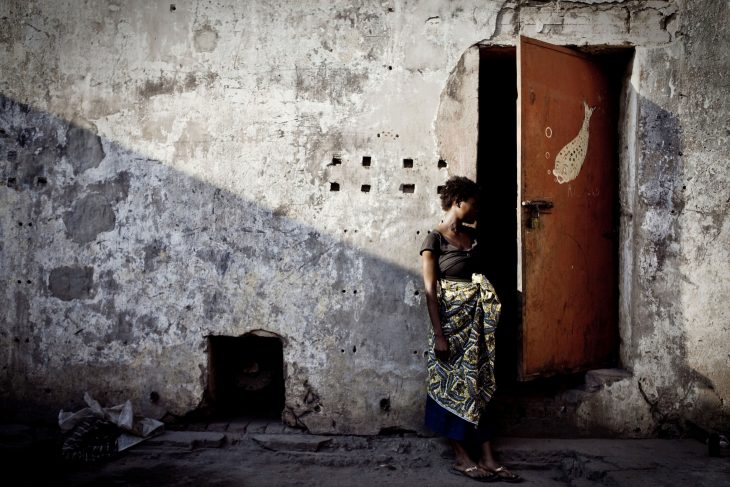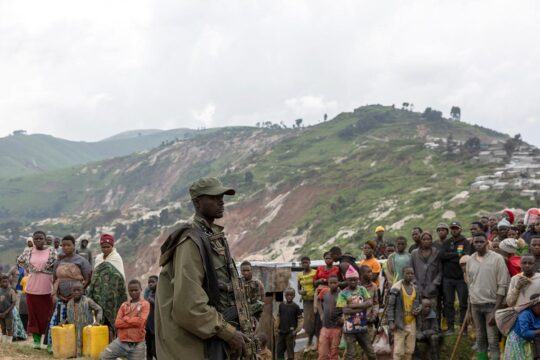Impunity still rules in the Democratic Republic of Congo, especially in the east, where rebel groups -- and also the Congolese army -- have killed, looted and raped. The government has apparently made some effort to bring justice for victims. As well as referring a few individuals to the International Criminal Court, there have been about 30 war crimes cases tried before military courts in the country.
One such case is the Minova rape trial. In November 2012, following a humiliating rout by the M23 rebel group, the Congolese army was ordered to retreat to the small town of Minova in North Kivu province. There, soldiers went on the rampage, committing atrocities including mass rape.
Under international pressure and with international support, a trial was organized before a Congolese military court. Thirty-nine people were put on trial, 25 rank-and file soldiers and 14 officers. But in an October 1, 2015, report, Human Rights Watch says “victims deserve better justice”. Geraldine Matteoli-Zeltner, international justice advocacy director at HRW, spoke to JusticeInfo.Net about why:
Geraldine Matteoli: The verdict was disappointing in that only two rank and file soldiers were found guilty of rape. We’re talking at the minimum of 100 rapes in Minova, and the result is only two perpetrators are identified and convicted. All the officers were acquitted. Overall this trial was extremely disappointing because it didn’t bring justice to either the victims or I would say also the accused, in the sense that a lot of the other soldiers were convicted of pillage without real evidence. So there was really a question of fairness for a number of the soldiers. We also documented, for example, that two of the commanders who were brought to trial had actually been demoted before the Minova events and seem to have been brought there as potential scapegoats, to be brought on a platter to the international community who insisted on justice.
JusticeInfo.Net: Your report also talks about weaknesses in the prosecution…
GM: It seems to us that the key problems we saw in this trial are fairly illustrative of other war crimes and crimes against humanity cases in the Congo generally. The three key issues in the case seem to have been very poor investigations -- and you have to remember the case was very complex, with thousands of victims, thousands of soldiers, many different battalions, very difficult to establish who was in charge at the time. And clearly the Congolese investigators did not have the right expertise to build a case around such a complex crime scene. A second big problem that I just mentioned relates to the rights of the accused: having strong enough representation, having the right to appeal, which the accused didn’t have in this case because of the specific court where the case was held. (…) And then the third big issue in Minova, which is again a good example of what’s happening more broadly in Congo, is this lack of willingness to go after the top guys. You know, you have trials for the rank and file soldiers, but really no will to go after high level commanders, who are often protected within the army or by political elites or others.
JusticeInfo.Net: So what are your recommendations?
GM: We’re calling not only on the Congolese government but also on international partners to make changes that really go to the heart of the fundamental problems. What we think would fundamentally change the situation is the creation of an internationalized mechanism, meaning either chambers or a court within the judicial system in Congo that would include international staff.
JusticeInfo.Net: As you said, the problems in this case are quite like other cases, such as in the killings of journalists or human rights defenders. It could be seen as putting on a show and making sure the top guys are still protected. Isn’t there just a lack of political will, or not enough control by the central government?
GM: I think it’s probably a combination of both, and I find in Congo questions of interference are very broad and difficult to pinpoint. There’s often interference from people within the political sphere. There’s also interference from the hierarchy within the Congolese army. High-level people in the police or army are very powerful figures in Congo. There can also be interference from the judicial hierarchy as well, top people who are placed there to protect certain interests. But at the end of the day, I think you are right, there is an issue of political will to go after certain perpetrators in Congo. There might be some willingness to have some justice when the perpetrators concerned are low-level perpetrators, but when it starts touching difficult, sensitive potential targets there is a lack of political will. And that is why we think this internationalized mechanism would help not only with the specific expertise that is needed but also to tackle this issue of political will and to isolate a justice mechanism from potential interference.
JusticeInfo.Net: Has this idea of an internationalized mechanism been accepted by the Congolese government?
GM: Yes, the Congolese government has proposed two laws actually, to create such an internationalized mechanism. (…) So it seems that the government has to some extent accepted the proposal and worked on drafting these laws, but probably has not invested enough efforts in convincing the parliament to accept these two draft laws. And in discussions we’ve had with people in parliament in Kinshasa, one realizes that a lot of parliamentarians are scared of what this mechanism would mean for them. You have to remember that a lot of people in parliament in Congo have a troubled past, were maybe active with some of the rebel groups in the ‘90s, and so there are still a lot of concerns about what may happen with themselves.
JusticeInfo.Net: Why do you think we need an internationalized mechanism in Congo when we have the International Criminal Court?
GM: There are limitations that the International Criminal Court is facing because it’s investigating seven other situations, and even though it’s continuing investigations, there haven’t been any other indictments in recent years and I think it’s difficult to know when the Court will actually be able to deal with future cases. So I think unfortunately the problem is that in Congo there is a continuation of very grave crimes being committed (…) and there’s just simply a huge impunity gap between the situation on the ground and what the International Criminal Court has been able to do.
I think it’s also important to remember that there were very serious crimes committed before 2002, the date from which the ICC has jurisdiction, and the mechanisms the government proposed were both going back to ’93 or ’90, so looking at those crimes committed 20 years ago, not just during the ICC temporal jurisdiction. So I think the idea is that all of these different levels would work together. We still strongly think that there’s a place for the ICC, because there are probably crimes that even this internationalized mechanism could not handle. For example, Human Rights Watch has called on the ICC to investigate foreign support to rebel groups in eastern Congo. This is something we have documented for several armed groups, support coming from army, military officials in Rwanda or Uganda, knowing full well that these groups are committing atrocities.







